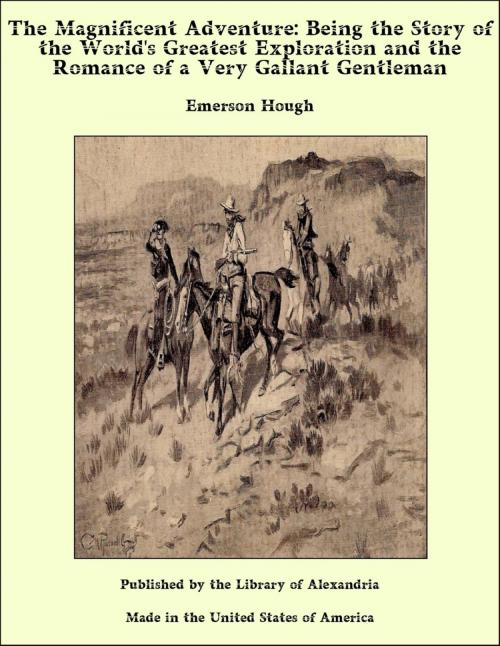The Magnificent Adventure: Being the Story of the World's Greatest Exploration and the Romance of a Very Gallant Gentleman
Nonfiction, Religion & Spirituality, New Age, History, Fiction & Literature| Author: | Emerson Hough | ISBN: | 9781465611925 |
| Publisher: | Library of Alexandria | Publication: | March 8, 2015 |
| Imprint: | Language: | English |
| Author: | Emerson Hough |
| ISBN: | 9781465611925 |
| Publisher: | Library of Alexandria |
| Publication: | March 8, 2015 |
| Imprint: | |
| Language: | English |
A woman, tall, somewhat angular, dark of hair and eye, strong of features—a woman now approaching middle age—sat looking out over the long, tree-clad slopes that ran down from the gallery front of the mansion house to the gate at the distant roadway. She had sat thus for some moments, many moments, her gaze intently fixed, as though waiting for something—something or someone that she did not now see, but expected soon to see. It was late afternoon of a day so beautiful that not even old Albemarle, beauty spot of Virginia, ever produced one more beautiful—not in the hundred years preceding that day, nor in the century since then. For this was more than a hundred years ago; and what is now an ancient land was then a half opened region, settled only here and there by the great plantations of the well-to-do. The house that lay at the summit of the long and gentle slope, flanked by its wide galleries—its flung doors opening it from front to rear to the gaze as one approached—had all the rude comfort and assuredness usual with the gentry of that time and place. It was the privilege, and the habit, of the Widow Lewis to sit idly when she liked, but her attitude now was not that of idleness. Intentness, reposeful acceptance of life, rather, showed in her motionless, long-sustained position. She was patient, as women are; but her strong pose, its freedom from material support, her restrained power to do or to endure, gave her the look of owning something more than resignation, something more than patience. A strong figure of a woman, one would have said had one seen her, sitting on the gallery of her old home a hundred and twenty-four years ago. The Widow Lewis stared straight down at the gate, a quarter of a mile away, with yearning in her gaze. But as so often happens, what she awaited did not appear at the time and place she herself had set. There fell at the western end of the gallery a shadow—a tall shadow, but she did not see it. She did not hear the footfall, not stealthy, but quite silent, with which the tall owner of the shadow came toward her from the gallery end. It was a young man, or rather boy, no more than eighteen years of age, who stood now and gazed at her after his silent approach, so like that of an Indian savage. Half savage himself he seemed now, as he stood, clad in the buckskin garments of the chase, then not unusual in the Virginian borderlands among settlers and hunters, and not held outré among a people so often called to the chase or to war.
A woman, tall, somewhat angular, dark of hair and eye, strong of features—a woman now approaching middle age—sat looking out over the long, tree-clad slopes that ran down from the gallery front of the mansion house to the gate at the distant roadway. She had sat thus for some moments, many moments, her gaze intently fixed, as though waiting for something—something or someone that she did not now see, but expected soon to see. It was late afternoon of a day so beautiful that not even old Albemarle, beauty spot of Virginia, ever produced one more beautiful—not in the hundred years preceding that day, nor in the century since then. For this was more than a hundred years ago; and what is now an ancient land was then a half opened region, settled only here and there by the great plantations of the well-to-do. The house that lay at the summit of the long and gentle slope, flanked by its wide galleries—its flung doors opening it from front to rear to the gaze as one approached—had all the rude comfort and assuredness usual with the gentry of that time and place. It was the privilege, and the habit, of the Widow Lewis to sit idly when she liked, but her attitude now was not that of idleness. Intentness, reposeful acceptance of life, rather, showed in her motionless, long-sustained position. She was patient, as women are; but her strong pose, its freedom from material support, her restrained power to do or to endure, gave her the look of owning something more than resignation, something more than patience. A strong figure of a woman, one would have said had one seen her, sitting on the gallery of her old home a hundred and twenty-four years ago. The Widow Lewis stared straight down at the gate, a quarter of a mile away, with yearning in her gaze. But as so often happens, what she awaited did not appear at the time and place she herself had set. There fell at the western end of the gallery a shadow—a tall shadow, but she did not see it. She did not hear the footfall, not stealthy, but quite silent, with which the tall owner of the shadow came toward her from the gallery end. It was a young man, or rather boy, no more than eighteen years of age, who stood now and gazed at her after his silent approach, so like that of an Indian savage. Half savage himself he seemed now, as he stood, clad in the buckskin garments of the chase, then not unusual in the Virginian borderlands among settlers and hunters, and not held outré among a people so often called to the chase or to war.















